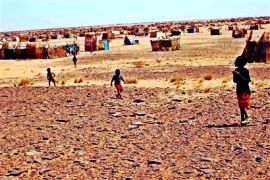Khartoum says slum demolitions consensual
KHARTOUM, March 29 (Reuters) – The governor of Khartoum said on Tuesday displaced people had agreed to move to remote camps outside the Sudanese capital and had fabricated stories about forcible resettlement to obtain aid.

|
|
Children roam in el-Fatih displacement camp, 38km (24 miles) from the Sudanese capital Khartoum Monday, March 21, 2005. Only one-half of the camps population has been allocated plots of land, but they are not allowed to rebuild their homes on them. (AP). |
“We had discussions with them. We decided with them the zero hour,” governor Abdel Halim al-Mutafi told Reuters. “They had seen the area to where they have been transferred before they were transferred to it — I went myself.”
U.N. officials and those involved say authorities have forced tens of thousands of people in the past few months to move from the suburb of Shikan to the desert camp of al-Fatha, away from the city centre.
Their new home, 40 km (25 miles) out of town, has no running water, electricity, health facilities or shelter. Residents said nine children died from cold during the move.
Asked why all the people in al-Fatha told the same story of the authorities driving them out and demolishing their houses without warning, Mutafi said they were lying to get help.
“By saying so they will gain sympathy from the NGOs (non-governmental organisations) and the press and they believe this will bring help to them,” he said.
He added that many people had dismantled their own homes.
“We are building an asphalt road to al-Fatha. It’s an area very rich with (underground) water… The process of building things is going on,” he said.
Governments have for years demolished the capital’s squalid, sprawling slums which house more than 2 million people from all parts of war-ravaged Sudan, but mostly from the south where more than two decades of civil war ended only in January with a peace deal. The United Nations has expressed concern over the policy.
Asked if services like schools and health centres should be in place before people are moved out to new areas, he said: “We don’t have the money.” Sudan, until oil exports recently began, was one of the world’s poorest nations.
The governor, who took up his post in 2001, said NGOs had made the people dependent on aid and said that was why the displaced in the camps did not build latrines for themselves, like poor villagers in Sudan’s countryside did.
Men and women relieve themselves in public on the dirt tracks throughout the slums.
But al-Mutafi said the United Nations was not working to help in any of the Khartoum slums, even though U.N. officials had said their conditions were worse than the camps in the western Darfur region, where almost 2 million people have fled their homes because of violence.
U.N. officials last year called Darfur one of the world’s worst humanitarian crises. Conditions have since improved.
“Let them come to help. I don’t like to be told how to transfer my people,” he said.
